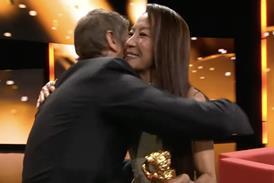As Ruby Films’ Jane Eyre opens in UK cinemas this weekend, the film’s screenwriter Moira Buffini speaks to Screen about the pleasure - and pressure - of adapting a much loved-classic.
Already an established playwright, British writer Moira Buffini has successfully made the jump into screenplay writing with two features for Ruby Films - Tamara Drewe and Cary Fukunaga’s Jane Eyre, which is being released in the UK this weekend by Universal. Backed by BBC Films and Focus Features, the beautifully shot and impressively adapted version stars Mia Wasikowska and Michael Fassbender as Jane and Rochester.
Next up for Buffini is a film adaptation of her own play Byzantium, which is being directed by Neil Jordan for Number 9 Films and is due to shoot in October, although she has no plans to give up on the theatre with a new play in the works for the National Theatre.
Buffini chatted to Screen at a special screening of Jane Eyre at London’s Soho House last night where Ruby producer Alision Owen also revealed that the film originated from her own desire to try to make a definitive version of Jane Eyre, which was her favourite book as a teenager.
Did you feel a big pressure adapting such a well loved classic as Jane Eyre?
Moira Buffini: Yes, given how much it means to people. I had a couple of moments of complete fear and then I thought, I can’t be doing with all of that. I’ve got to jump confidently into the book for better or for worse, and not to revere it as classical literature and recreate it for this very different medium.
I absolutely loved it. It was spending every day in my favourite book. I found it such a satisfying creative exercise. There is one scene in the novel between Jane and Rochester which goes on for 16 pages and so I had to convert that into a filmically digestable scene, which was an enormously satisfying challenge.
How did you go about condensing a 400-page book into a two-hour film?
If you know the book you will know that the structure is different. I got two thirds of the way through writing the first draft and thought, this is never going to work to follow the narrative structure of the book. Introducing the Rivers family as entirely new characters two thirds of the way through the film would drag it down. So I knew I had to put the Rivers’ story at the beginning so that it’s almost told by the time you come back to them. Then the pace of the film doesn’t collapse and sag.
Most of the dialogue is a distilled version of what’s in the book. The language in the book is beautiful and I really wanted to honour it.
Was there any pressure to “sex up” the story to appeal to younger audiences?
There was never pressure. The book is passionate. You don’t have to have snogging to have passion. I think it is one of the most passionate books in the English language. It is all about repressed people. And that is what makes it even more passionate.
In previous film versions we have been used to seeing older actors playing Jane and Rochester (such as Orson Welles and Joan Fontaine in 1944, Charlotte Gainsbourg and William Hurt in 1996).
Mia [Wasikowska] and Michael [Fassbender] as actors, are exactly the same age as Jane and Rochester. Traditionally they have always been cast 10 years older. But I think the youth of them really works. Michael was the Rochester we hoped we would get.
Your screenplays have been based on literary works and your own plays to date..would you like to write an original screenplay?
It’s always easier to have source material. Even to the point where I would say if I had an original idea I would write it as a play first. Because of the collaborative nature of film-making, a lot of people have to agree and it’s easier to agree if there is source material. I admire the entirely original screenplays, because I haven’t yet had the bottle to do one!
The number of female screenwriters out there is still shockingly low. Why do you think that is?
It is actually really surprising to me because it is such a wonderful job for a woman, particularly because it is one of the few jobs you can do in the industry where you can juggle it with having children. The hours for directors and crew members are punishing and you have to be away from home for a long time. As a screenwriter you can just about juggle it. I also love the collaboration bit. Being in a room on my own is the least favourite bit of my job.
It is changing though, there are more women coming up every year who are choosing it as a career. Women have made an enormous success of writing in TV and I think that will cross over really soon.
You trained as an actor..has it helped you as a screenwriter?
I think it was the best possible training. You get a feeling for what works, having seen things from the actor’s perspective. One of the things I learnt as an actor was how to improvise and I do that now, improvising for every character. I’m very glad I did that and not a screenwriting course. You come at it from outside the box. Another really important thing that acting teaches you is how to take knocks. Because if you can’t take knocks as a writer, you’re in trouble.






















No comments yet